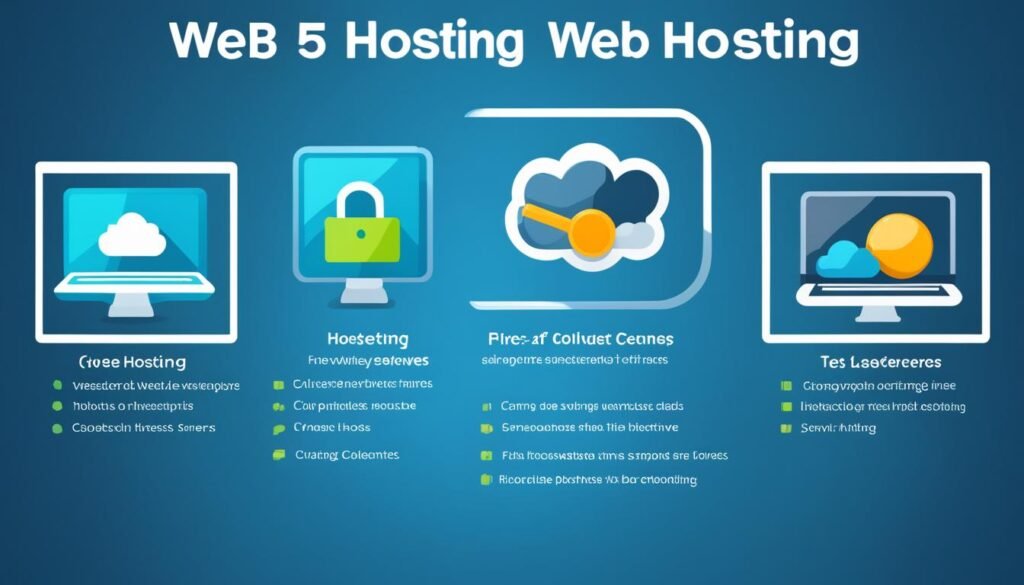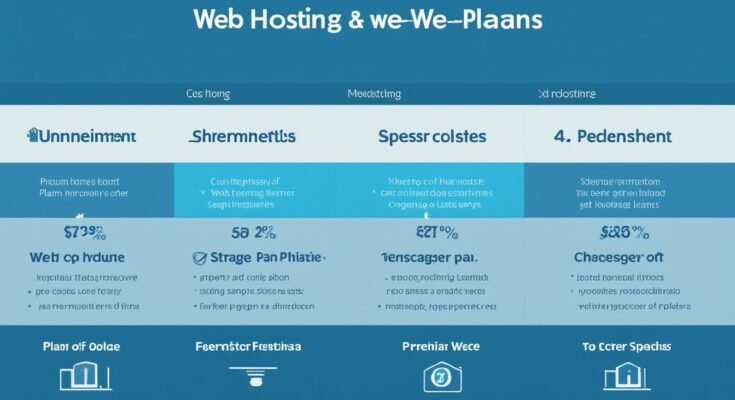When it comes to creating a website, choosing the right web hosting plan is crucial. Different types of hosting plans offer various features, performance levels, and pricing options, making it essential to understand the options available to you.
In this article, we will explore the different types of web hosting plans, including shared hosting, dedicated hosting, VPS hosting, managed WordPress hosting, colocation hosting, and cloud hosting. By understanding these options, you can make an informed decision and find the perfect hosting plan for your website’s needs.
Key Takeaways: Web Hosting Plans
- Web hosting plans offer different features, performance levels, and pricing options.
- Shared hosting is a cost-effective option suitable for small websites.
- Dedicated hosting provides maximum control and performance.
- VPS hosting combines features of shared and dedicated hosting.
- Managed WordPress hosting is optimized for WordPress websites.
What Is Website Hosting?
Website hosting plays a crucial role in making your website accessible to visitors. It involves storing and hosting your website files on a computer known as a server, allowing users to access your website through the internet. So, what exactly is website hosting and how does it work?
Website hosting refers to the process of renting space on a server, typically offered by a web hosting service provider, to store your website’s content. This content includes various files such as HTML documents, images, videos, and other media that make up your website. By hosting your website, you ensure that it is available to users at all times.
When you choose a web hosting provider, you typically have the option to select from different hosting solutions and packages. These offerings cater to different website needs and provide various features and resources to support your online presence. By creating a web hosting account with a reputable provider, you can take advantage of the hosting solution that best suits your requirements.
Now that we’ve covered the basics of website hosting, let’s delve deeper into the different types of web hosting plans and find out which one is the right fit for your website’s needs.
Comparison of Web Hosting Solutions
| Web Hosting Solution | Key Features | Suitable For |
|---|---|---|
| Shared Hosting | Affordable pricing, shared resources | Small websites, low traffic |
| VPS Hosting | More control, virtual private server | Businesses with specific needs |
| Dedicated Hosting | Maximum performance, exclusive server | Large enterprises, high traffic |
| Managed WordPress Hosting | Optimized for WordPress, additional features | WordPress websites |
| Colocation Hosting | Use your hardware, data center infrastructure | Large businesses |
| Cloud Hosting | Scalable resources, flexibility | Websites with growing needs |
The Five Main Types of Web Hosting

When it comes to web hosting, there are five main types to choose from. Each type offers different features and benefits to cater to the specific needs of different websites. In this section, we will explore each type in detail:
1. Shared Hosting
Shared hosting is the most popular and affordable option for hosting websites with low to moderate traffic. With shared hosting, multiple websites share the same server resources, making it a cost-effective solution. It is suitable for small businesses, personal websites, and blogs. However, since resources are shared, website performance may be affected by other websites on the same server.
2. VPS Hosting
Virtual Private Server (VPS) hosting combines the affordability of shared hosting with the flexibility and control of dedicated hosting. In VPS hosting, a physical server is divided into multiple virtual servers, each with its own resources and operating system. This allows websites to have more control, scalability, and security. VPS hosting is ideal for growing websites that require better performance and customization options.
3. Dedicated Hosting
Dedicated hosting offers the highest level of control and resources. With dedicated hosting, you have exclusive access to a physical server dedicated to your website. This means you can customize the server’s hardware, software, and security configurations according to your specific requirements. Dedicated hosting is ideal for large businesses, high-traffic websites, and applications that demand maximum performance and security.
4. Managed WordPress Hosting
Managed WordPress hosting is specifically designed for websites built on the WordPress platform. It offers WordPress-specific optimizations, including automatic updates, enhanced security measures, and specialized support. Managed WordPress hosting providers take care of technical aspects, allowing website owners to focus on content creation and growth. This hosting option is suitable for WordPress users who want hassle-free management and optimized performance.
5. Colocation Hosting
Colocation hosting is a specialized option for businesses that want to own their hardware while utilizing the infrastructure of a data center. With colocation hosting, businesses store their servers in a colocation facility, which provides power, cooling, and network connectivity. This option gives businesses complete control over their hardware and a high level of security. Colocation hosting is typically used by large enterprises that have specific hardware requirements or need to maintain compliance.
Choosing the right type of web hosting is crucial for the success of your website. Consider factors such as traffic, scalability, control, and budget when making your decision. Now, let’s take a closer look at shared hosting and its features in the next section.
Shared Hosting

Shared hosting is a popular and cost-effective option for website owners who are just starting out. In shared hosting, multiple websites share resources on a single server, making it an affordable choice for entry-level website hosting. This type of hosting is ideal for small businesses, personal blogs, and portfolio websites that don’t require extensive resources or high traffic volumes.
With shared hosting, website owners can benefit from a range of website hosting services provided by hosting companies. These services include user-friendly website builders, easy one-click installations of popular content management systems, and access to a variety of web development tools.
Benefits of Shared Hosting:
- Cost-effective: Shared hosting plans are affordable and often come with flexible pricing options, making them suitable for budget-conscious website owners.
- Easy to manage: Hosting providers typically offer user-friendly interfaces and control panels that make it easy to manage website files, databases, and email accounts.
- Technical support: Most shared hosting plans include technical support from the hosting provider, ensuring that website owners can get assistance when needed.
- Scalability: Shared hosting plans are scalable, allowing website owners to upgrade their hosting packages as their websites grow.
- Reliability: Hosting providers offer reliable server infrastructure and uptime guarantees to ensure that websites are accessible to visitors.
When choosing a shared hosting plan, it’s important to consider factors such as disk space, bandwidth, email accounts, and additional features. Many hosting providers offer shared hosting plans with different features and pricing options, allowing website owners to find the best fit for their needs.
| Shared Hosting Plan | Features | Price |
|---|---|---|
| Starter | 10 GB disk space Unlimited bandwidth 1 website |
$9.99/month |
| Business | Unlimited disk space Unlimited bandwidth 5 websites |
$14.99/month |
| Pro | Unlimited disk space Unlimited bandwidth 10 websites |
$19.99/month |
Choosing the right shared hosting plan depends on your website’s requirements and budget. It’s important to balance features, performance, and price to ensure that your website receives reliable hosting services. By opting for shared hosting, you can enjoy affordable hosting plans without compromising on the quality and reliability of your website hosting services.
VPS Hosting

In today’s digital landscape, businesses need reliable and flexible hosting solutions to meet their specific needs. VPS Hosting, which stands for Virtual Private Server Hosting, offers a perfect balance between shared hosting and dedicated hosting.
With VPS hosting, your website gets its own isolated virtual section on a server. This means that you have more control over the resources and configuration compared to shared hosting. It’s an ideal choice for business owners who require additional control and customization.
One of the main advantages of VPS hosting is scalability. As your business grows, you can easily upgrade your VPS hosting plan to accommodate increased traffic and resource requirements. This scalability ensures that your website can handle high volumes of visitors without compromising on performance.
But managing a VPS server can be complex, especially for those without technical expertise. Fortunately, many web hosting providers offer managed hosting for VPS plans. With managed hosting, the hosting provider takes care of technical tasks such as server maintenance, security patches, and software updates. This allows you to focus on your core business while enjoying the benefits of a VPS hosting environment.
In addition to managed hosting, some web hosting providers also offer cloud hosting plans for VPS hosting. Cloud hosting utilizes multiple servers working together to provide better reliability and performance. It offers additional redundancy and flexibility compared to traditional VPS hosting plans.
When choosing a VPS hosting plan, it’s important to consider your business needs. Evaluate your website’s traffic, resource requirements, and budget to determine the most suitable plan. Look for reliable web hosting providers that offer competitive pricing, robust infrastructure, and excellent customer support.
Key benefits of VPS hosting:
- Increased control and flexibility compared to shared hosting
- Scalable resources to accommodate business growth
- Managed hosting options for technical support
- Cloud hosting plans for enhanced reliability and performance
Comparison of VPS hosting plans from top web hosting providers:
| Web Hosting Provider | Plan | Price | Storage | Bandwidth | Support |
|---|---|---|---|---|---|
| Provider A | VPS Basic | $19.99/month | 50 GB SSD | 2 TB | 24/7 |
| Provider B | VPS Pro | $29.99/month | 100 GB SSD | 3 TB | 24/7 |
| Provider C | VPS Deluxe | $39.99/month | 200 GB SSD | 4 TB | 24/7 |
When comparing VPS hosting plans, consider factors such as storage, bandwidth, customer support, and pricing to find the best match for your business needs. Ensure that the plan offers enough storage and bandwidth for your website’s requirements and that the provider offers reliable support.
With VPS hosting, businesses can enjoy the benefits of a dedicated environment without the high costs associated with dedicated hosting. It’s the ideal solution for businesses looking to take their website performance to the next level while maintaining control over their hosting environment.
Dedicated Hosting

Dedicated hosting is a powerful web hosting solution that offers exclusive access to a physical server dedicated to a single website. With dedicated hosting, website owners have complete control over the server’s hardware and software configurations, providing maximum performance and customization options.
This hosting option is commonly used by large enterprises and websites with high traffic volumes that require robust resources and reliability. Dedicated hosting ensures optimal speed, security, and scalability to accommodate growing businesses and demanding online applications.
Hosting companies offer dedicated hosting plans with various features and pricing options to cater to different website owners’ needs. These plans typically include:
- Dedicated server: A powerful hosting server solely dedicated to one website.
- Root access: Full administrative control over the server for complete customization.
- Hardware customization: The ability to choose specific hardware components based on requirements.
- Scalable resources: Flexible allocation of resources such as CPU, RAM, and storage.
- 24/7 technical support: Expert assistance to ensure smooth server operation.
- Enterprise-level security: Robust measures to protect against cyber threats and unauthorized access.
Dedicated hosting provides an ideal environment for resource-intensive applications, e-commerce websites, large databases, and mission-critical online operations. It offers unparalleled performance, reliability, and flexibility, meeting the demands of businesses that cannot compromise on performance.
Figure: Dedicated hosting offers complete control over the server’s hardware and software configurations.
Managed WordPress Hosting

Managed WordPress hosting is a specialized web hosting service designed exclusively for websites built with WordPress, the popular content management system. It offers a host of benefits and features tailored specifically to optimize the performance and security of WordPress sites.
With a managed WordPress hosting plan, website owners can rely on the expertise and infrastructure of a web hosting provider to handle all technical aspects of their WordPress site. This includes regular software updates, security monitoring and protection, automated backups, and performance optimization.
One of the significant advantages of managed WordPress hosting is the enhanced security it provides. Web hosting providers offering managed WordPress hosting plans typically include WordPress-specific security features to protect websites from common vulnerabilities and attacks. These features may include malware scanning and removal, firewalls, SSL certificates, and advanced authentication options.
In addition to security, managed WordPress hosting plans also focus on optimizing the performance of WordPress sites. This includes server configurations specifically optimized for WordPress, caching systems, and content delivery networks (CDNs) to ensure fast page loading speeds and an excellent user experience.
Furthermore, managed WordPress hosting providers offer extensive support for WordPress users. Their support teams are knowledgeable about WordPress-specific issues and can provide assistance with WordPress installations, site migrations, plugin recommendations, and troubleshooting.
Overall, managed WordPress hosting allows website owners to focus on creating and publishing content while leaving the technical aspects of website maintenance and security in the hands of professionals. It provides a convenient and hassle-free hosting solution for WordPress sites, ensuring optimal performance, security, and support.
Key Features of Managed WordPress Hosting:
| Feature | Description |
|---|---|
| Automatic WordPress Updates | Regular updates to ensure the latest version of WordPress is being used, including core files, themes, and plugins. |
| Enhanced Security | WordPress-specific security measures to protect against hacks, malware, and other security threats. |
| Managed Backups | Automatic backups of your WordPress site to protect against data loss. Restore options available. |
| Performance Optimization | Server configurations and caching systems to ensure fast page loading speeds and optimal performance. |
| Expert WordPress Support | Knowledgeable support teams to assist with WordPress-related issues and provide guidance. |
Colocation Hosting

Colocation hosting is a specialized hosting option where businesses own their hosting hardware and rent space in a data center for power and maintenance. It offers the advantage of using your infrastructure without the need for physical space and associated costs. Colocation hosting is typically used by large businesses that require maximum control over their hardware and want to benefit from data center infrastructure. It is a more expensive option and requires technical expertise for setup and management.
With colocation hosting, businesses can leverage their own hosting server and equipment while taking advantage of the data center’s secure and reliable environment. This allows companies to have complete control over their hardware and software configurations, ensuring optimal performance and security.
Furthermore, colocation hosting eliminates the need for businesses to invest in costly infrastructure, such as power backup systems, cooling systems, and on-site technicians. By utilizing a data center’s already established infrastructure, businesses can significantly reduce their hosting cost and focus more on their core operations.
Benefits of Colocation Hosting:
- Maximum control: Colocation hosting allows businesses to have complete control over their hosting hardware and configurations, ensuring customized solutions tailored to their specific needs.
- Reliability: Data centers offer redundant power supplies, UPS systems, and backup generators, ensuring maximum uptime and minimizing the risk of downtime due to power failures.
- Scalability: Colocation hosting provides businesses with the flexibility to scale their infrastructure as their needs grow. They can easily add or upgrade servers without the hassle of managing physical space and associated infrastructure.
- Connectivity: Data centers provide high-speed internet connections and multiple network providers, ensuring fast and reliable connectivity for businesses.
- Security: Data centers offer advanced security measures, including surveillance systems, access control, fire suppression systems, and redundant network connections, ensuring the protection of business-critical data.
Colocation hosting is an ideal choice for businesses that require maximum control, security, and flexibility over their hosting infrastructure. While it may involve higher upfront costs and technical expertise, the benefits outweigh the investment, providing businesses with a reliable and scalable hosting solution.
Cloud Hosting

Cloud hosting is a powerful and flexible web hosting solution that harnesses the benefits of cloud infrastructure. It utilizes multiple interconnected servers to provide scalable resources and reliable performance for websites of all sizes.
With cloud hosting, websites have the ability to grow and adapt seamlessly as their resource needs change. This scalability allows businesses to handle traffic spikes and accommodate increasing demands without any downtime or performance issues. Cloud hosting plans are designed with flexibility in mind, allowing website owners to scale up or down as required, ensuring efficient resource allocation.
One of the key advantages of cloud hosting is its customizable nature. Website owners have the flexibility to choose the exact amount of resources needed, including storage, processing power, and bandwidth. This level of customization ensures optimal performance and cost-efficiency, as businesses only pay for the resources they actually use.
Many web hosting providers offer cloud hosting plans alongside their traditional hosting services. These plans combine the features of different hosting types, providing the best of both worlds. Cloud hosting integrates the scalability and resource management capabilities of the cloud with the reliability and security of traditional hosting options.
“Cloud hosting allows websites to harness the power of a distributed network of servers, ensuring high availability and redundancy. The distributed nature of cloud hosting ensures that even if one server fails, the website remains accessible as the workload is automatically shifted to other servers.”
For businesses looking for the best web hosting services, cloud hosting is an ideal choice. It offers a robust infrastructure, scalable resources, and unparalleled reliability. With its flexible and customizable nature, cloud hosting solutions cater to the diverse needs of websites, from small blogs to enterprise-level e-commerce platforms.
Advantages of Cloud Hosting:
- Scalable resources that can be adjusted according to website needs
- High availability and redundancy with distributed server infrastructure
- Flexibility to accommodate growing demands and handle traffic spikes
- Cost-efficiency by paying for actual resource usage
- Reliable performance and minimal downtime
Considerations for Choosing a Cloud Hosting Plan:
- Resource requirements in terms of storage, bandwidth, and processing power
- Scalability options to ensure room for future website growth
- Security features and data protection measures
- Management and support provided by the hosting provider
- Integration with other services or technologies
Cloud hosting offers an innovative and efficient hosting solution that caters to the evolving needs of modern websites. Its scalability, flexibility, and reliability make it one of the best hosting options available today.
| Cloud Hosting Providers | Features | Price Range |
|---|---|---|
| 1. AWS (Amazon Web Services) | Scalable infrastructure, extensive service offerings, global network | Varies based on usage |
| 2. Google Cloud | Reliable performance, advanced analytics, integrated developer tools | Varies based on usage |
| 3. Microsoft Azure | Seamless integration with Microsoft products, AI and machine learning capabilities | Varies based on usage |
Web Hosting features.
The Best Web Hosting Services for 2024
Choose a web hosting provider that understands starting small and scaling up.
Do I Need A Web Host?
Conclusion
In conclusion, selecting the right web hosting plan is crucial for the success of your website. By understanding the different types of web hosting plans, you can make an informed decision that aligns with your website’s needs and budget.
For small websites with low traffic, shared hosting is a cost-effective option. It allows multiple websites to share resources on a single server, providing affordable hosting plans.
If you require more control and resources, VPS hosting offers virtual sections on a server, bridging the gap between shared and dedicated hosting. It is an ideal choice for businesses with specific needs.
For maximum performance and customization options, dedicated hosting provides exclusive access to a physical server. It is suitable for large enterprises or websites with high traffic.
Managed WordPress hosting is specifically optimized for WordPress websites, offering additional features and support. It takes care of technical aspects, such as software updates and security.
Colocation hosting is designed for businesses that want to use their hardware in a data center environment. It provides maximum control over hardware configurations.
Lastly, cloud hosting offers scalability and flexibility by utilizing multiple servers. It is suitable for websites that require scalable resources and want to take advantage of advanced hosting solutions.
Remember to consider your website’s needs and budget when choosing a web hosting plan. By doing so, you can ensure the best performance and user experience for your website.
FAQs
Q: What is web hosting?
A: Web hosting is a service that allows individuals and organizations to make their website accessible via the World Wide Web.
Q: What are the different types of web hosting plans available?
A: There are various types of web hosting plans available including shared hosting, dedicated hosting, VPS hosting, cloud hosting, and managed hosting.
Q: What features should I look for in the best web hosting services?
A: When selecting a web hosting service, look for features such as uptime guarantees, customer support, server reliability, security features like SSL certificates, and scalability options.
Q: What is shared web hosting?
A: Shared web hosting is a type of hosting where multiple websites share the resources of a single server, making it a cost-effective option for small businesses or personal websites.
Q: How do I choose the best cheap web hosting services for my needs?
A: To choose the best cheap web hosting service, consider factors like your website’s requirements, budget, customer support, uptime guarantees, and scalability options.
Q: What are SSL certificates and why are they important for my website?
A: SSL certificates are digital certificates that encrypt the data exchanged between a user’s browser and the website, ensuring secure communication and establishing trust with visitors.
Q: Why is it important to keep your website hosted with a reliable web host?
A: Keeping your website hosted with a reliable web host ensures consistent uptime, fast loading speeds, reliable customer support, and secure data storage.




